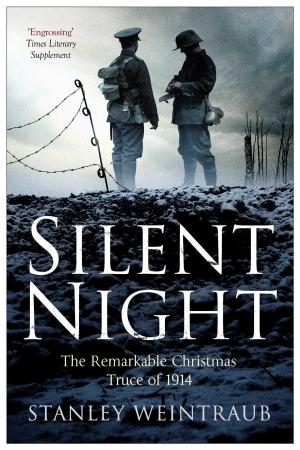Only five months after the outbreak of the Great War in Europe, on and around Christmas Day 1914, the sounds of rifles firing and shells exploding faded in a number of places along the Western Front in favor of holiday celebrations in the trenches and gestures of goodwill between enemies. Late on Christmas Eve 1914, men of the British Expeditionary Force heard Germans troops in the trenches opposite them singing carols and patriotic songs and saw lanterns and small fir trees along their trenches. Messages began to be shouted between the trenches.
Only five months after the outbreak of the Great War in Europe, on and around Christmas Day 1914, the sounds of rifles firing and shells exploding faded in a number of places along the Western Front in favor of holiday celebrations in the trenches and gestures of goodwill between enemies. Late on Christmas Eve 1914, men of the British Expeditionary Force heard Germans troops in the trenches opposite them singing carols and patriotic songs and saw lanterns and small fir trees along their trenches. Messages began to be shouted between the trenches.
- Earlier, on December 7, 1914, Pope Benedict XV had suggested a temporary hiatus of the war for the celebration of Christmas, asking “that the guns may fall silent at least upon the night the angels sang” to allow for negotiations for an honorable peace. The belligerent countries refused to create any official cease-fire, but on Christmas the soldiers in the trenches declared their own unofficial truce. -
At the first light of dawn on Christmas Day, some German soldiers emerged from their trenches and approached the Allied lines across no-man’s-land, calling out “Merry Christmas” in their enemies’ native tongues. At first, the Allied soldiers feared it was a trick, but seeing the Germans unarmed they climbed out of their trenches and shook hands with the enemy soldiers. The men exchanged presents of cigarettes and plum puddings and sang carols and songs.
There were other accounts of soldiers from opposing sides crossing the trenches to exchange seasonal greetings, food and souvenirs. There were even reports of soldiers playing a good-natured game of soccer in no-man’s land. These Christmas football matches are the stuff of legend. The truth of the accounts has been disputed by some historians.
- Private Ronald MacKinnon, a 23 year old from Canada, wrote a letter home about Christmas on Vimy Ridge in 1916: “I had quite a good Xmas considering I was in the front line. Xmas eve was pretty stiff, sentry-go up to the hips in mud of course. […] We had a truce on Xmas Day and our German friends were quite friendly. They came over to see us and we traded bully beef for cigars.” Private MacKinnon was killed four months later during the Battle of Vimy Ridge. -
Some other soldiers used the short-lived ceasefires for a more somber task: the retrieval of the bodies of fellow combatants who had fallen within the no-man’s land between the lines. The so-called Christmas Truce of 1914 (German: Weihnachtsfrieden) was not observed everywhere along the Western Front. Elsewhere the fighting continued and casualties did occur on Christmas Day. Some officers were unhappy at the truce and worried that it would undermine fighting spirit.
After 1914, the High Commands on both sides tried to prevent any truces on a similar scale happening again. Despite strongly worded orders prohibiting fraternisation, there were some isolated incidents of soldiers holding brief truces later in the war, and not only at Christmas. In what was known as the 'Live and Let Live' system, in quiet sectors of the front line, brief pauses in the hostilities were sometimes tacitly agreed, allowing both sides to repair their trenches or gather their dead. However, soldiers were no longer amenable to truce by 1916. The war had become increasingly bitter after devastating human losses suffered during the Battles of the Somme and Verdun, and the use of poison gas.
The Christmas Truce of 1914 was one of the last examples of the outdated notion of chivalry between enemies in warfare. It was never repeated in that war - future attempts at holiday ceasefires were quashed by officers’ threats of disciplinary action - but it served as heartening proof, however brief, that beneath the brutal clash of weapons, the soldiers’ essential humanity endured. During the Great War, the soldiers on the Western Front did not expect to celebrate on the battlefield, but even a world war could not destroy the Spirit of Christmas.
[The following titles are not available in the PPL collection]
- Ashworth, T., Trench Warfare 1914-1918: the Live-and-Let-Live System, London, Pan, 2000.
- Boyle, D., Peace on Earth: the Christmas Truce of 1914, London, Endeavour Press, 2014.
- Brown, M. and S. Seaton, Christmas Truce: The Western Front, 1914, New York, Hippocrene Books, 2001. (Rev. and expanded edition, original 1984)
- Crocker, T.B., The Christmas Truce: Myth, Memory, and the First World War, Lexington, University Press of Kentucky, 2015.
- Eksteins, M., The Rites of Spring, New York, NY, Mariner Books, 2000.
- Weintraub, S., Silent Night: the Remarkable Christmas Truce of 1914, London, Pocket Books, 2002.
